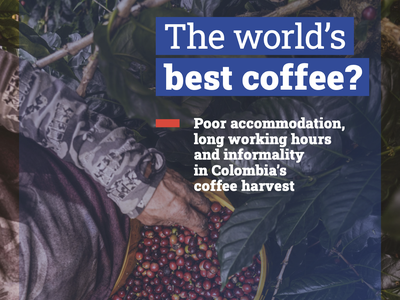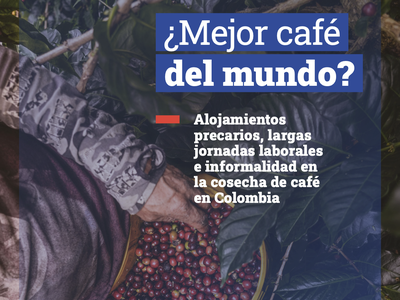FOR IMMEDIATE RELEASE
Investigation reveals labor rights violations on certified coffee farms in Colombia
São Paulo, June 27, 2025 – An investigative report by Brazilian non-profit Repórter Brasil, with support from Coffee Watch, exposes widespread labor rights violations on coffee farms in Colombia, including those certified by major sustainability schemes such as Fairtrade, Rainforest Alliance, 4C, and C.A.F.E. Practices, the Starbucks sourcing program.
Field visits to farms in the key producing regions of Antioquia and Huila documented informal labor, excessive working hours, and unsafe living conditions. Workers – many of them Venezuelan migrants – reported long days of manual harvesting on steep hillsides without contracts, social security, or health coverage. Accommodations lacked basic infrastructure such as showers, ventilation, and personal space.
Despite claims of ethical sourcing, coffee from these farms reaches global markets through companies like Nestlé, Starbucks, Jacobs Douwe Egberts, NKG, and Volcafe. Customs data from late 2024 to early 2025 confirm exports to the United States and Europe through intermediaries linked to the Colombian Coffee Federation (FNC) and certified cooperatives.
The report questions the credibility and transparency of certification programs. Organizations like Fairtrade and Rainforest Alliance admitted to gaps and announced follow-up investigations after being contacted by Repórter Brasil. Starbucks and 4C claimed their certifications had expired, despite signage still displayed at the farms.
The findings come at a critical time. The EU Deforestation Regulation (EUDR), which prohibits the import of products linked to deforestation and human rights abuses, will apply to coffee starting in December 2025. Many Colombian producers and exporters may be unprepared to comply.
“Our coffee sector is nearly 300 years old and still fails to guarantee decent working conditions,” said Paola Campuzano Jaramillo, a project coordinator at the International Labour Organization (ILO) in Colombia.
The investigation also highlights the invisibility of temporary and migrant labor, systemic informality (affecting over 80% of the workforce), and the persistence of child labor on coffee farms.













